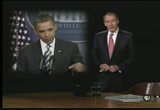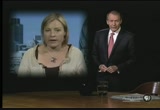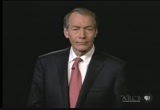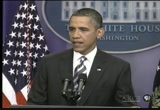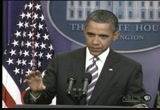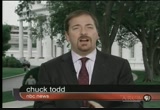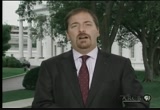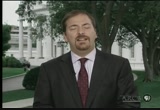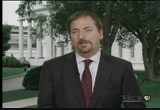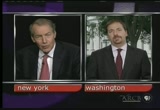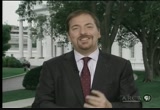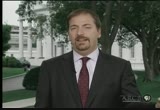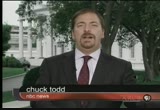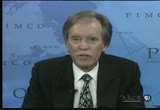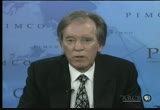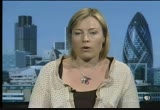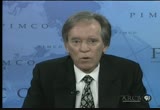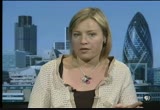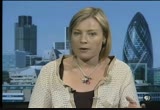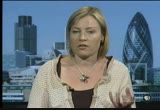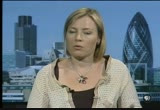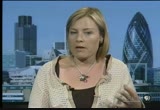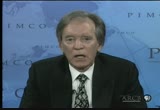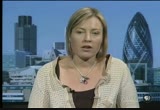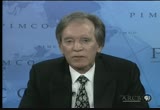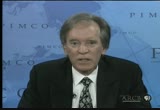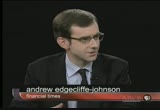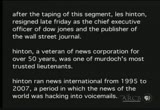tv Charlie Rose PBS July 15, 2011 11:00pm-12:00am PDT
11:00 pm
>> re: wcome to our program, w begin this evening withth the president's news conference earlier today in washington, with chuck todd of nbc news and hans nichols of bloomberg television. >> i think in the president's press conference we heard sort of a resignation of sorts tt look--e knows how this is going to end. he is going to get a small deal of some sort. and he wants to just define the ter of the post debate after the debt sealing is raed and after he signed someort of bil that might cut a litt bit of spending but isn't going include any tax hikes of any sort. might include a commission to look at entitlements or a congressional commission to look at tax reform. but ultimately it felt like almost a post dete. >> re: we okow to global implication of the conversations in washington and also in europe, the issue about sovereign debt. joining us for that, john chambers of standard & poor's, zanny menton of the economist magazine, gillian
11:01 pm
of "the financial times" and bill gross of pimco. >> the problems as john says may have actually helped e u.s. in the shorterm but we he the potential of a real perct storm for an accident othe debt ceiling coupled with a dramatic worsening of the euroland cris in the next coue of weeks which could really shore up financial markets when you have both happening at the same time. >> rose: finally with late developments in washington twak to andrew edgecliff johnson about you rupert murdoch and the news corporation case in london. >> i tell you today is not the end of the story but with the res ig make of rebekah brooks on tuesday, this is a story which will run for months if not years with police investigations, judicial inquiries, lawsuits and any number of other threats still piling up against the mpany. but it's a significant day. >> the president's press conference, global implications for europe and th united states and the rupert--upert murdoch case.
11:02 pm
funding for charlie rose was provided by the following: storyline. it's happening every day, all across america. every time a storefront opens. or the midnight oil is burned. or when someone chases a dream, not just a dollar. they are small business owners. so if you wanna root for a real hero, support small business. shop small. additional funding provided by these funders: and by bloomberg a
11:03 pm
provider of multimedia news and information services worldwide. from our studiosn new york city, this is charlie rose. >> psident obama had a press conferen earlier th morning following five days of closed door meetings with top congressional leaders. at the news conference his third in three weeks the president continued to press for a big deal to raise the debt ceiling and to reduce the deficit by $4 trillion. >> i am still pushing for us to achieve a big deal. but what i also said to the group is if we can't do the biggest deal possible, then let's still be ambitious. let's still try to at least get a down payme on deficit reduction. we are obviously running out of time. and so what i have said to the members of congress is that you need over the next
11:04 pm
24 to 36 hours to give me some sense of whayour plan is to get the debt ceiling rais through whatever mechanisms they can think about and show me a plan in tes of what you are doing for deficit and debt reduction. if they show me a serious plan, i'm readyo move. even if it requires some toh decisions on my part. and i'm hopeful that over the next couple of days 'll see this long jam broken because the american people i think understandably want toee washgton do its job. >> president obama ruled out a 2.4 trillion plan prosed by house republicans. >> in my expectation is that you will probably see the house vote on a couple of things just to make political statements. but if you are tries to get to 2 toy-- 2.4 trillion without any revenue, then
11:05 pm
you are effectively gutting a whole bunch of discretion-- domesti spending that is going toe too burdensome and not something that i would support. >> rose: joining me from washington is chuck todd chief white house correspondent for nbc news and host of the daily rundown on msnbc a hans nichols white house correspondent for bloomberg television. i'm pleased to have both of them here. chuck todd, tell me what consequence came out of the president's press conference that might have changed anything about where we are and where we go beeen now and august 2nd. >> well, i think if-- i don't know if anything changed, charlie but i think in the president's press conference we heard sort of a resignation of sorts that he knows how this is going to end. he's going to get a small deal of some sor and he wants to just define the terms of the post debate after the bt ceiling i raised and after he signs some sort of bill that might
11:06 pm
cut a little bit of spending but isn't going to include any x hikes on-- of any sort. might include a commissn to look at entitlements or a congressiol commission to look at tax reform but ultimatelyt felt like almo a post debate or a after action report even though we don't technically have the deal yet but we know what the deal is going to lack like. it's going to be a little convoluted, a little very senateese but it will raise the debt ceiling, we are not going to default and a little bit of spending will get cut. >> rose: and what will they say about who won and who lost, other than the american people. >> yeah, i think at the end of the day nobody won this debate. that it was essentially punted to find out whose's winning the battle of public opinion in november of 2012. that said, the actions by senate republicans tell you they believe they were starting to lose the debate as far as public opinion was concerned. or else you wouldn't have seen mitch mcconnell do these what i would call
11:07 pm
legislative gymnastics to come up with this solution in order to try to find anyway outf this box, save john boehner a little bit from having to figure out how to convince a bunch of house republicans to do this and he did. so i guess you could say they knew the president was winning. they just didn't want to lose badly to him on this round of debate. >> did they take a closer lo at what hpened to newtingrich a bill clinton's re-election or did they just know that going in in their bones so -- >> no, i think they were surpsed on a couple of things. they were surprised that the president called their bluff on the deficit reduction. about two weeks ago when he doubled down and said you know what, let's do the big deal. let's do the $4 trillion plan. he sort of-- sort of came late to the game. he kind of endord the bowles simpson plan which he still has never fully endorsed but the goals of it, he did enforce-- endorse in the last couple of weeks so they didn't quite expect that, the republicans in
11:08 pm
that sense and then that's when they started to retreat from some of their demands and they coun't retreat on taxes. so they had to am could up th a third way. as for the history of '95, it's funny, i think mitch mcconnell certainly looks at 95 and says boy, that is what re-elected bill clinton and he doesn'twant to be a part of that. john boeer looks at 9i think a little more with reminiscence. heees that that was good for house republicans then. this could have been good, he thought possibly could have been good for house republans now. but at the end of the day didn't have the votes toet it done. >> rose: boehner at that time a lieutenant to newt gingrich. >> that's right. he was in leadership at the time. thats why i think he sees it, well, you know, the shutdown, weigured it out andverybo won. rememb house republicans won. president clinton won. mitch mcconnell is the guy in the minority. mitch mcconnell is trying to get the majority here and i think he was of a different outlook and mind-set.
11:09 pm
>> hans, do you agree with that in terms of this is the beginning of the political debate that will take place between now and 2012, that in the end the president has sort of taken a sense of resignation as to the inevitability? >> well, it's not all passive, resignation implies that they are sort of resigned on this and don't actually see a way to alter the debate going forward. i think what you have seen in the last two weeks, three press conferences is the white house essentially buyi insurance for whatever outcome comes, whatever outcome happens. so whether or not you get some sort of biden deal which is amiddle deal or mcconnell which would be the weakest one or a $4 trillion deal, in all othose out comes with the $4 trillion seeming to be ptty farfetched right now, the white house looks the way that it falls for them. and as chuck was saying they kind of prepped the battlefield for what happens when recriminations happen and we all in the press corp. start writing our bong tick toks that charlie i can guarantee you we end up doing. >> but it will be, the
11:10 pm
president at the centre, i mean where he's wanted to be in this debate that will be the perception, that will develop? >> the adult at the centre. i thin that's >> clearly what the white house has be trying to do, really since january, sin kind of daily-- you have seen them try to pition the president as being reasonable, as being rational, and he's not,he president is not adverse to telling members of his own party and he's been very clear on that that therere some things that they should do that they might not want to do now but for the long-term are part of their shared progressive goals. you know, if you don't get entitlement spending under control you can't do some of the exciting things that the president may want to do or what he thinks is exciting in terms of the economy, or winning the future or whatever slogan they have. this is, they want to preserve their ability to do that and to do that they can't have the bond market screaming down at them telling them no, no, no. >> stephen: . >>ose: account president be faulted, chuck, because he has not laid out specifically and he was asked again today what he will do abt entitlement
11:11 pm
cuts? >> you know, i think he can be faulted here a little bit because again i go back to when bowles simpson was completed. and today when i-- i asked him specifically on bowles simpson and he wanted credit for creating the commission. and credit for making that, i was like okay, fine, but you didn't endorse their outcome. you know, he could have grabbed that in december. this is decemb of last year. he could have grabbed that, spent six months owning it and selling it. and then truly if republicans at the end of the day there are a lot of people in this white house, charlie, who believe repuicans never would have gned on to a big deal because ultimately the one part of the republican conference in that house was not going to sign on to anhing that reeked of a tax increase. fine, but that-- the presidents staked out higher ground lately but i would argue that higher ground would have a more solid foundation to it had he owned bowles simpson for six month. because guess what, tom
11:12 pm
coburn, had endorsed it he would have had a bipartisan consensus in his hand on white house stationery, charlie. it's actually lived on the white house.gov web site. and he sort of kept a hands-off approach about it really until the very,ery end. >> rose: and why, and do they in the white house today look at that as a mistake because they didn't? first, why didn't they do it? and do they now look back and say wish we had? >>here are some insid the west wing that will acknowledge that think might be in a difference placen th debate but boy, these guys like every white house never admit a mistake, number one. but i do think thereere a couple of reasons and it goes to e first pa of your question when i srted answering which has to do with ebb titlement. there was a specically, if you endorse all of wles simpson then would you have endorsed raising the retirement age and endorsed specifics about medicare and social security. that the base of this party didn't want them to
11:13 pm
tactically get binyet. and even today, he got it, he sort of was dragged out of him that it was for mea testing. >> yes, indeed. >> he did say he was for that. which is, that is a big deal for a democrati president to say that. on the record. but he wouldn't talk about what he was willing to do behind the scenes on social security, and that just tells you, you know, he was basically, look, i will show a little bit if boehner, you know, that was the deal with boehner, if you will show something publicly onhe bush tax cuts and boehner couldn't do it. >> hans? same question. >> i think there is a counterfactual to the bowles simpson and that is had the president gotten behind that like chuck said, six months ago, they would have never drawn paul ryan out on that medicare plan. so you wouldn't have had house republicans in a position where all of them voted for a plan that you can bet that we will hear from come november for ads being cut saying republicans want to eviscerate medicare. now the question i think is an open one is does their argument on that, is the white house argument on that
11:14 pm
exante or post. did they come up with it after they drew ryan out, ryan put his plan forward and all the house republicans voted for it or was this something they thought of afterwards like boy, gee, it was sure a good thing that we didn't come out and endorse bowles simpson because look at the alternative that we are at. republicans are on record here and all so far the president said we drew out of them in this press conference iwhere he is on ans testing for medicare which is hard to cut a campaign ad on that. >> rose: let me understand, hans, where you think this is going to end up. >> i think it ends up mcconnell plus simp-- mcconnell plus biden, which is to say you have some tax, maybe some changes in the expenditures, the loopholes, very, very minor though. you have a lot of cuts in terms of spending. mostly in defense and not a whole lot of touching of medicare, social security, none of it really on the entitlement and then you have some sort of commission and you have a series of
11:15 pm
votes and the next two years for to raise it further. but nothing in the $4 trillion range. i just, you know t could happen, boehner could actually control his party and get that done but i think boehner has an internal problem there that he can only look at newt beginning lip and say gee, you know f only we are 95. newt was in charge. he was running thin. that's a big difference in terms of the '95 compare ton-- comparison to today. >> rose: what is going to happen over the weekend. >> it is harry reid, mitch mcconnell, the two senate leaders. they are negotiating the final remnantof thisendment. they will do this political posturing t behind the scen i can tell you know jon kyl, the number two republican in the senate, eric cantor number two republican in the house, they areehind the scenes meeting to figure out how much of these spending cut does you need in the mcconnell, plus i agree with hans t is mcconnell plus and
11:16 pm
harry reid and s commission, all that gets lumped in together. the white house by the way, jack lou, bill daly, these guys, they're involved in the re-- reid mcconnell negotiations at this point. >> rose: right. >> so this is, it's being put together, okay. and it's a little bit of mcconnell, as hans put it, a little bit of the cuts that they had agreed to on biden d then throwing in harry reid's commission. >> rose: tha you, chuck, great to you have on the program. >> great to see you, sir. >> rose: hans, welcome and we'll see you again soon. >>hanks for having me. >> rose: we move nowo the glob economy and the challenges to it. not only in the con secretaries-- context of the president's press conference, also the fact that the european union issued results today for stress tests it conducted on banks throughout the region. eight out of 91 institutions were deemed insufficiently capitalized. the results arve at time of increasing unease as europe fes a growing risk of contagion. financial markets in the
11:17 pm
united states also under duress as a debt ceiling deadline looms without a resolution. yesterday andard & poor's said that there is a 50% chance it will downgrade the u.s. credit rating within three monthsf washington fails to agree on a debt deal. joining me now here in new york is john chambers, chairman of s&p sovereign ratings commtee. anny-- zan economics editor for the economist magazine, gillian at the time. and joing us from newport beach, california, bill gross, the founder and co-chief investment officer of pimco. mi pleased to have all of them and i begin with john chambers to tell us about what you said and what did the s&p say today and should this be a surprise? >> i don't think it should be a surprise that we placed the aaa rating and the a 1 plus rating on u.s. government debt with credit watch on negative implications. we've had a negative outlook on the u.s. economic debt nce april. the prime motivation is the medium term fiscal prospects for the u.s. government
11:18 pm
which are-- could get to a position which would no longer be compatible with a train el a rating. and whereas in april w thought that the u.s. government would have a cole of years to put their house in in order, we think actually this is now the defining moment. that if deal is n done now that you probablyon't get anotr deal for another couple of years. >> you see august 12nd as the deadline. >> the augt second is the complicating factorment we think the debt ceiling will be raised but certainly these negotiationsave gone on longethan we expected and they have been more tangd thane excted. and dow have a very low probability but high impact event that you would get to august 2nd without the debt ceiling having beenraised. >> rose: it is your lack of confidence that the government has the ability to deal with the problem more than anything else. >> i think tha this correct characterization, at the heart of the matter is the political contract and the entractable state of negotiations between the republicans and the democrats.
11:19 pm
>> rose: bill cross you hav have-- bill gross you have written and talked about your lack of confidence in the american economy. dow share of the view of john chambers that they very well may not be able to come to terms and if they do, it will be a half solution which will not satisfy your own concerns. >> i do, charlie. i think they'll come to some agreement but i think what this debt crisis demonstrates more than anything is the dysfunctionality of the american political system and wh it bodes for future years. i mean a parliamentary system like canada orhe u.k. can produce a rather immediate thumbs up or thumbs down on fiscal direction but in the u.s. and divided congress and perpetual election mode have lead to inaction. i'm not seeing just do something becausethe ght policiesre important as john has indicated but we have to become d -- we have become a kick the can nation or ai think the younger
11:20 pm
generaon would say we've become a fake ill you make it nation and that's gointo affect economic grth negatively for future ars. >> is this more the presidens fault or republican congress fault? >> well, i think it's both. i mean there's an intract ability here in terms of philosophy. we basically have a canes versus a-- type of moment in which e democrats are suggesting capital injection and stimulus and-- stimulus and the republicans are suggesting capital destruction and a return to balanced budgets. it's a situation, philosophical moment that really defies resolution in terms of coming together on a middle ground and that i think is t problem. the election in 2012 will probably dece it one wa or the other. >> that will be the great debate of the 2012 campaign. >> oh, i think so. it will center around jobs but it will center around the solution to those jobs
11:21 pm
whether or not a balanced budget inneblingt effect produces or leads to stronger economic growth or weather the government stimulus in the proper direction does that. >> rose: how do you see? this inability of the american government to deal with what is obvious been a possible fors for a while? >> it's pfouny depressing. there is nothing else you can say about it and in the last couple of weeks it's that depressing reality has taken on an air of pant mine. the last couple of wee i have been in london and come backo the u.s. and just watching the tv, seeing the seens, seeing the name calling, seeing it build to some climax. i think in the end the debt ceiling will be raised but that's a very fake kind of deadline it is a totally self-imposed one. underneath it as bill said is this very really big question is how is the u.s. in the medium term going to sort out itsiscal hand. at's it going to do. and i think the debate is about what kind of government dow want. you have on the one side republican party absolutely
11:22 pm
no willingness to increase revenu in anyway. a very diffent kind of size of state, scope of state that the democrats have. and that's a fundamental clash at, you know, i look at it from the outside and it seems to me that the answer is kind of staring people in the face. the u.s. is aelatively low taxed economy compared to others, an incredibly inefficient tax system and in the medium term i see no way of sorting out the u.s. fiscal policy without revenue increases. but we haven't got there in this political debate yet. it's a very big clash. >> rose: you are normally here with me in new york, gillian, but now are you in london i assume just chenging in at the home office. but welcome. >> thank you. well, i mean i'm doing the exactly the opposite of what zanny is doing. i'm normally in new york. i just arrived in londofor a few da. and it's very fascinating looking at the u.s. from the perception of london. because a year ago when the new coalition government was elected into power in the u.k., they did come out with an austerity plan. there are plenty of people who hate the plan.
11:23 pm
we're having in london now monstrations from teachers, strikes, that kind of stuff. but nobody denies that there is a plan and there's actually being immet-- implemented. it's quite interesting to us why the u.k. is in such a different portion. it's partly because as bill said we have a parliamentary system here in the u.k. it's partly because there's history showing the british people that they've been through austerity before in the970s and come through the other si. but the other really big issue, of course, is that the u.k. has greece and ireland sitting on its doorsteps and that caused quite a psychological shock t just for politicians but voters too. >> rose: bill, wt dow make of the fact that eight out of 93 failed. >> and there are small banks in greece and spain. but you know, what it reflects, really, is the lack of capitol within your. >>o land itself or at lea a lack of capital balance. euroland actually has less debt to gdp than the united states. the problem is t balance. it's the south versus the
11:24 pm
north. and it's like comparing it to a rowboat with too many passengers on one side or the other. and it tips. what's required really is some type of rebalancing, some type of effort from a central bank le the ecb or some type of fiscal policy from what is known as the esff to basically get funds from one untry to the other. and of course the political ramifications and problems in doing that have been the problem to this day. >> the problems in euroland as john says may have actually helped the u.s. in the short term but we have the potential for a really perfect storm here for some kind of accident on the debt sealing in the u.s. coupled with a dramatic worsening of the euro land crisis in the next couple of weeks which could really shock financial markets when you have both happening at the same time. so the difference is that this one, i think in the short term at least a self-induced mess. the u.s. is not bust i don't think n any meaningful sense. >> the president tried to make that clear in his press conference.
11:25 pm
>> absolutely. the euroland one however say much more fundamental crisis it is, it's true that overall the euro debt level isn't too high. but some countries are esseially insolvent and you have them in the stricture of the single currency and basically the europeans have no clue as to how they will get out of it. they have been kickhe can down the road far more than the u.s.. >> re: assuming there will be a rescue. >> they have. and they have no clarity about how they will solve it. i'm beginning to think it is a very sort of integrity of the euro zone will start coming into question. >> gillian? >> i was going to say a couple of weeks ago i wrote a column that made me very unpopular with my colleagues saying if you plan to have a summer hool day thiyear don't, because as zanny says we have the makin of a perfect storm in the next few weeks with not just the u.s. heading towards potentially very nasty shock but also the euro zone. and what's really important about today's stress test is this. although the governments have stressed the banks for some losses on their
11:26 pm
holdings of government bonds, they've only stressed them on the part of the bank books in the trading book, the tough they buy and sell. the stuff they planto hold to maturity has not actually suffered in i haircuts. they haven't factored in the idea that that could lose any money. and worse still, the type of haircut the potential losses that the banks have been stressed for is only in the order of 25% for greece or considerably less, around 20% for ireland. and frankly there are lots of people out there in the markets today saying well, it could get much, much worse than that. the worst-case scenario has not yet been factored in the stss test and eveno. we've had eight out of the 90 or so fail them. so the question now is anyone actually going to believe that europe has yet to become clean about the scale of its financial probms. >> and so therefore the perfecstorm coul happen. >> it is a vicious cycle because basically the banks and governments are completely entwined and if everyone believed that the governments are going to get
11:27 pm
their house in in order than naturally people would start to believe the banks account for real. and similarly if people thought the nks were coming clean about their losses, that would bolst faith in the governments too. but right now nobody believes, really trusts either the banks or the government. and as zanny said, although europe is solvent, germany say rich country, it could solve the problems if it had a rags centralized federal system, unfortunately politics is getting in the way, not just from the u.s. but in the euro zone as well. it really is politics, politics, politics now. >> it is. there are basically two directions the euro zone goes in, either the periphery economy defaults in a chaotic way and has to leave the euro or the system has to become more centralized. the problem is a diametric political opposition. the germans do not want to bail out what they see as profligate southerners but yet they are terrified on financial default on the european financial systems that is why we have had this kick the c down the road. the europns, we've been criticizing them for
11:28 pm
muddling throughfor being competent. it is not that wehink that not onlyre they inmpetent policymakers t isore that they have to square these political political tensions and they haven't been able to do it i think we are coming to crunch time in europe which is going to be a much, much bigger, harder to deal with crunch time than the u.s. one with. the reason i worry about the perfect storm is simultaneously. >> rose: bill, go ahead. >> i think zanny is right, gillian as well. we areoving it to an end ga here with what we suggest are two corner solutions. one, from a positive standpoint, i suppose, the euro union could move to some type of cross guarantees of most or all countries and incorporate ultimately a fiscal union on the other side. we could see some countries leave the euro zone and default at the same time and so both of those particular corn solutions have entirely different
11:29 pm
consequences in terms of financial markets and the economy. but clearly the middle ground in terms of kicking the can as has been done for the past 12 to 18 months is not a preferred type of soluti. >> you have a fiscal problem in greecbut the other place is the fiscal problem is not so bad. but you have an external problem which we thought had been kind of solve once and for all with the euro area. but with 2008 we got the return of home marketbias and you've got banks, major important part of your creditor class, are the banks who are no longer willing to extend additional funding and if you are rung a current account deficit of 10% or more in the peripheral countries all of a sudden youre c off. and the way out of this is not to resort back into national boundaries but a broader fiscal union that actually shared the fiscal flows, of that centralized the debt. a little bit what the united states went through i 1791 when hamilton and jefferson sat down and consolidated the colony's debt. >> gillian you wergoing to say and i will come right
11:30 pm
back, go ahead. >> i was going to say on that last point about hamilton, i was very amused to see the other day some very senior euro zone leaders reading the history of the hamiltonian period in french. which is looking more relevant by the moment. but i mean we really had at a corner point, a pivot point and what makes it so fascinating is that on both sides of the atlantic you have these incredibly potentially binary outcomes. and what we could see unfold over the next few months is wide given the inclusion of these two crucial crunch points tand makes it very hard not just for people to price in the risk if you are trading the markets but also very hard for the rating agencies to actually assign a single number to the range of possibilities to what is going to happen. if a country say like greece does default then you can bet your bottom dollar the very nexday will you see a lot of dramatic downgrades foruropean banks because the government and the financial sector are so entwined. and yet if the coury esn't defatif there is
11:31 pm
fiscal union then suddenly the banks are all halty. so it really is very entwined patent developing. >> is this simply ciumstances out of control or would leadership of a different kind have made a difference here? >> i think clearly leadership of a different kind would have made a difference. i sometimes think back to the comparisons with 2008 and people make these comparisons, we are likely to see another moment. and while i think the uncertainties about where the efforts are and how much they are worth are rather different, the big thing that is different now is that the political uncertainty is much greater then. financial markets were in turmoil but in the end the government came n the cavalry came in and saved the day and so forth. though time the source of the problem is government and government's inability to agree on what they have to do. that is a fundamental difference and much scarier because there is no other fay god mother here. >> rose: four of us here, or certainly three of us are looking at this from the perspective of journalism, are you looking at that time from a ring agency, mr. gross from a very different perspective.
11:32 pm
you have a lot of money on the line. so what do you-- give me a sense of how you as an investor look at this today. >> well, we look at it, arlie from the standpoint of cleanest dirty shirt, admittedly almost all developed countries have high debt levels and somewhat dirty shirts. but you want to as an investor loo towds cotries which have the cleanest balance sheets, the lowest budget deficits and the ability, importantly, which isn't thease in euroland to devalue or to print money going forward to get out of the debt crisis. you know, the unitedtates is in that catory but canada, germany and believe it or not some developing countries such as brazil have. cleaner dirty shirts in terms of their balance sheets and ability to grow going forward. >> we have all seen this
11:33 pm
paradigm shift to th east to asia in terms of economic power. is all that we are going through in europe and the united states simply going to accelerate that ship? >> i think it is. and i think that it's also going to change the perception of what is a safe asset. it's interesting that bill mentioned that. the idea used to be that advanced economies always were the safe asset, the aaa rated ones, they were safer. is is fast changing. if you look at the budget deficits, the debt loads, some of the big emerging economies, better than anything in the rich world and i think we are beginng to see a very profound reassessmentf what is a risky asset. >> i myself am not certain. i'm not sure asia can decouple. >> can i decoup wheel ever happens to u >> we have export lead economies. a lot of the investmen is set towards e export sector. >> if the markets go down thenhey go down. >> if you had a serious diocation in the developed world, asia would go down with it. >> gillian. >> you know,.
11:34 pm
>> go ahead,. >> i think that's right, john. but you know, i think you speamore to a technical reversal in terms of flows as opped to fundamentals. the emerging markets, developing markets, gynea-- china, brazil, india all have better growth prospects in terms of a rather underdeveloped consumer sector and the ability to grow from that standpoint versus the developed markets. in addition they have trillions of dollars worth of reserves whereas the developed countries are in hawk to those nations so from those standpoints the developing countries are in much better shape going forward over the next five to ten years as opposed to the developed. >> gillian? >> onef the most interesting things that moodies said this week when it gave warning that it might downgrade the u.s. debt fm aaa was that it was leaving the ratings of companies, large american companies unchanged. and essentially the underlying, somethg you are already seeing in market
11:35 pm
prices where in the markets right now the risk attacks to sereign debt is actually higher than some of the big, solid american companies or similar patent in europe as well. and that's very unusual. but essentially what moodies was saying and what you are seeing in the markets i a world where investors are saying well, actually, the economy isn't completely busted. there are some fanstic companies in the west. some very well-run companies in the west. the problem is that the governmentaren't run nearly as well as the companies. it really is about corporate governance in government. it's really about political risk above all else. and ironically that' the kind of patent we used to see in relation to emerging market debt where people would say ll, this country is growing fast but we don't like the political risks because they are unpredictable. right now is unpredictably on both sides of the atlantic that is the prlem. >> bill what is going to happen to people who hold u.s. treasuries? >> how are they going to handle them. >> well, they've got to get their money. you know the problem, in
11:36 pm
terms of treasuries is that if they are downgraded by john's company rating agencies by standard & poor's or moody's that the interest expense goes up. and it's hard to know how much. but you know, i would suggest an actual downgrade of u.s. treasury debt would lead to perhaps 25 basis points or a quarter of a percent higher in terms of interest expense over a longer period of time. and that by the way charlie would accrue not just to the treasury but the corporations and to u.s. citizens as well because that's the benchmark for all other debt. and so we would see that and we would see perhaps a cost in terms hundreds of do you points and perhaps a 3 to 5% devaluation of the dollar as well. a downgrade of u.s. debt is a serious, serious proposition. >> does monetary policy have an impact here today? >> unless the fed does something. >> absolutely. monetary policy has an
11:37 pm
impact in that you know this is all taking place against the backdrop of a slowing economy, economy prospect looking not so great. so i think the fed has the capacity to step in and brighten that scenario. on the other side of the atlantic in europe, e plays an essential role because they are the only institution that i come in and basically do this kind of quasi fiscal union it can buy italian bonds it could buy spanish bonds if necessary. it's the fairy god moth their exists in europe. but the question is whether the ecb is prepared to do that and politically would be able to. it's interesting that the incoming ecb president is italian. does he want his first action to be lar scale purchase of italian bonds. it's going to be a pretty tough thing to do. but in 2008 the central bank came into the rescue. this time around they could do so too but i think to a lesser degree and against the backdrop of thiloss of confidence in the politician. >> the ecb also has the ability to cause things to break apart because if the ecb stops handling greek
11:38 pm
bonds and stops accepting them as collateral in its operations as it is threatening it might do then that would have pretty devastating consequences. and again that could be the benning of the end game. >> go ahead. >> it could, but it would need to be i think in the end have to decide whether it wants to be a tough central bankith nothi to be a central bank of because it precipitates the breakup what is it going to do. >> are we missin anything here in this conversation that could have a dramatic effectn the conserations we are raising? >> you know, upside, downside. >> well, there's always -- >> there are always geo political issues that could up set the apple cart. >> a nass-- assassinations, war, or oil prices. >> oil prices are sometimes underestimated their impact. bill would have a better view on th than i. but i think setting out this perfect storm and august is a slow trading month, many bad things can happen in the month of august. >> yeah, let me mention -- >> in financial history. >> that this is from 30,000 as opposed to 25,000 feet, i
11:39 pm
guess. but the problem in a developed world basically is that they've assumed too much debt and as studies by rogueoff and lion heart they did a book cald it's different this time. reaches a 90% level, econic growth slowsown by about 1%. we have seen that over the past several years, developed nation growth has slowed from 3 to 2 and is that a problem. well, yes, it is, because 2% is really the level at which we encounter what is called stall speed. it's basically a level which corporate profs don't grow, at which corporations stop investing. and unempyment is not reduced and perhaps increases. and so this 2% number where we're at really reflects the tipping point, not just for economies but for financial markets going forward. suppose you had the capacity
11:40 pm
to do what you believe was the right thing to do. what kind of agreement would you have coming out of washington. >> i would quickly pass the ceiling with no limitations and then i would move towards a-- an investment bank, a central government directed investment bank whe people are put back to work. i mean we have discouraged this idea. i don't know why the o bomba administration has done so by moving to the center but basically it's what's required during periods of time in which unemployment is high and the private sector refuses to invest going forward. and the capital markets. ancapital spending. and so what is required, really, obama has recommended an infrastructure bank but we need to put people back to work with some type of directed investment in substantial numbers. it's a complete waste of people power, and productivity to have a 9%
11:41 pm
plus unemploymenrate to have people sitting down as opposed to standing up and working. i would put shovels in their hands. i would get some things done that are required to be done in the united states. >> rose: gillian? the power goes beyond your. >> well, if are you talking about america, i would ecosome of what bill said but i would also adopt the simpson bowles bipartisan fiscal commission recommendations for late last year. frankly they were pretty sensible. and they are roughly similar to what the u.k. has been doing. it's very obvious you need a mixture of revenue increases and spending cuts, 3 to 1 is pretty good proportion and they just pass that now. >> i would do exactly what gillian said. i think the first order would be to pass the debt ceiling, to pass a series-- think is absurd you have this debt ceiling legislation anyway. most countries pass budgets, pass tax,. >> the president even made that point. >> so i would really
11:42 pm
incrse that so it was no longer an sue. and then you know, the recipe is pretty clear. don't do anything that involves too much short term spending cuts because the economy is incredibly fragile. it needs that support. but put in place credible medium term plan and bowles simpson is a pretty good prototype. put that in place. >> i agree with everything that has been said with one exception, bill's idea of a national development bank. we see that, we see it kfw and germany. we see the gynea development-- chyna development bank, an instrument of quasi fiscal inacvity. i n't think is very effective policy mechanism. i grant you, i worked project administration could have, was useful in the 30s, maybe useful again but development bank is something that i wouldn't endorse. but you don't make-- somebody doesn't page-- s&p doesn't make policy recommendations but you need a fiscal plan, it is about 7% of gdp and if you don't get that, there is just going to be less room to maneuver next time we have a crisis. >> thank you all, a pleasure
11:43 pm
to you have on the broadcast. back in a moment. stay with us. new developments emerged today in the controversial phone hacking sndal which has rupert murdoch's media empire called news corp. under sooej. rebekah brooms of news corporate international resigned after pressure that has already seen the closure of the news of the world and withawal of news corp. plan bid to take full control of british sky broadcasting. brooks said in a statement released throu new internatiol quotas chief executive of the company i feel a deep sense of responsibility for the ople we hurt and want to reiterate how sorry mi for what we now know to have sustain place. despite her resignation brooks will still fe the house of commons committ next week with rupert murdoch and his son james murdoch. this weekend murdoch and news international wl apologise to the british public for the phone hacking scandal through a series of full page advertisements headed we arsorry.
11:44 pm
rupert murdoch said news international will take further concrete steps to resolve ese issues and make amends for the damage they have caused. joining me now t discu this ongoing story is andrew edgecliff johnson of the financial times. i am pleased to have him here to provide some context to this extraordinary day on one more day in the story. welcome. >> thank you, charlie. >> so where is the story, is it simply waiting for the appearance of the three of them, murdoch, murdoch and brooks on tuesday? >> i can tell you today is nothe end of the story, the resignation of rebekah brooks, and tuesday probably won't be either this is a story which will run for months if not years with poli investigations, dici inquiries, lawsuits and any number of other threats still piling up against the compy. but it's a significant day. i think over the last two weeks we've seen a series of attets by rupert murdoch and his clost counselors to take the pressure off, since the allegations first exploded that the news of the world had authozed the
11:45 pm
accessing of the--issing teenager who turned out to be murdered minidoler. in is exploded in the public mind in briin and has spre around the world affecting even u.s. investors perceptions of the wider empire which goes so much wider than these british wspapers. through that period, rupert murdoch and his son james seemed absolutely determin to stand by rebekah brooks, there are very few people in this company who are closer to rupert and the whole family to his children as well than rebekah brooks, she was a very integral member of this sort of london court that had formed around james and his sister elizabeth and which had included david cameron and other members of the british poticamedia establishment. only a week or so ago rupert murdoch said he had total confidence in rebekah brooks. the first thing he did when he flew into london to try and sort this crisis out was stage a photo opportunity
11:46 pm
with his arm around rebekah, asked what his first priority was on landing in london. he pointed to her and said this one. >> rose: so why did she resign? >> i think becausehe attempts to take the pressure off so far had failed. the closure of the news of the world is dramatic and expensive move. this paper had bn going for 160 plus years. rupert murdoch bought it2 years ago it was his big entry on to the world stage after leaving australia. >> rose: the largest circulating paper in london. >> 2.3--.7 million a day, used to sell 6 to milon in its glory days. so this is an extraordinary, papers don't shut down overnight like that either. in these troubled times. he h done that he pulled the bid for sky. he had agreed after changg his mind on thursday to pear before parliament. none of those things had takethe pssure o. the reason that he had kep rebekah brooks right by his
11:47 pm
side for so long was i think in part that she acted as a huge shield. she was a focus of so much of the danger of the british public and media as the former editor of not only the news of the world but the sun and other tabloids owned by news corporate's u.k. newspaper armies internatiol. and if she were to go, then questions would be raised about other people higher up the chain. so her predes never thi job les hinton was there for 12 years before moving to dow jones. and rupert murdoch's son james took overs ahead of news corporate european late 2007. onof the first things he had to do was to go in to their newspaper headquarters in east london and try and calm this scand down. even in 2007 there ha been arrests, the royal reporter of the news of the world had been sent to jail by that stage. so he went and tried to settle wit some of the people. that is now coming back.
11:48 pm
>> so this is a huge test fohim. >> it is probably the biggest test in rupert murdoch's career and that sounds a very big big claim, about a man who nearly lost his company 20 years ago. i think at the time it was, that was purely business. he was negotiating with the banks. and there were scores of banks at the time. and if any one of them had pulled the plug he could have gone under. >> and one had threatened or suggested he might. >> but this is a man who has prospered in the way he has in part by readin the public mood and by infiltrating himself into the political establishment. espeally in london where there is this very tight nit group of politicians and media executives who socialize together david cameron and rebekah brooks would have lunch tethein the country and in london. so this is an unusual situation in the u.k. and rupert murdoch for all the fear he was held by man
11:49 pm
politicians had been very charming to the political steakment over the years he rt oflmost worked his way to their affections. >> rose: both labor and tory. >> absoluty. over a very long period, came back to certainly margaret thatcher. >> rose: so what is it that people believe might be ere? what is it that one outside might say that murdoch empire has most to worry about? >> so i think there is a general worry, there is a spific worry. i would say t general worry. >> already serious stuff on the stable so-- no to minimize that. >> so let's go through the specific. we have criminal investigations by the metropolitan police. we have potential judicial inquiries. we have a number of lawsuits that had started before, the last two weeks to work through the cause and it's every likelihood that others will join the lawsuits and we'll get more claims against news corp. which could be very expensive. i think the more general question is whether news
11:50 pm
corp. itself, murdoch himself who isnown as a has on proprietor was in some way responsible for setting this culture. whether the aggression, the competitiveness for which he is admired and known. >> is it obvious that the culture at news corp. was dierent from every other media corporate. >> this is a very important point. certainly in the u.k. there is evidence that the private investigators were doing a lot of this great work were working for a number of other publications up and down fleettreet. and so very fewriti newspapersemerged with totally clean hands from this. >> have there been investigated as thoroughly as news rporate. no, at the moment th investigion has been very much centered on news corporate. the first allegations came out in 2005 that they may have tappeinto the voice-mails of the royal princes william and harry. and so that was where the investigation started. but i think we can very much pect that others will be drawn into it. there have been allations,
11:51 pm
some disputed this week that other news international papers, the son of the sunday times may have improperly got hold of information about affecting gordon brown. but -- >> gordonbrown suggested that himself. >> he has suggest that himself and the son ran a very strong denial of some of those clas o the front page the other day. so itis still in the realm of a very open and fast moving investigation. not all of these claims will prove to be true. and i think we have to be quite careful to assume that people are guilty before they-- or innocent before prov guilty. >> what do i expect murdoch to do. is there any sense of what he wants to do in his testimon >> i think he will be quite contrite in his testimony. >> clear from the weekend letter that this is a mind-set that they have. >> i think they have been advertised that the only way out of this now is contrition and apologies. veryuch reminded me actually of the play book we saw with bp after the
11:52 pm
deepwater horizon crisis of a year or so ago. the company was criticized fo reactg too late. now no sea birds havedied and no fisherman have lost their velihoods in this particular crisis. butir i think what we're seeing now is a fairly familiar play book pr play book of you take the product off the shelves whether it's tylenol that has been tarnished or the news of the world anthen you start apologizing and then you you say we're going to investigate. >> then you say we'll cooperate with all investigations. >> there is going to be an independent investigation with, you know, run by people who are not at the company at the time. >> rose: but you suggested this investigation will now not be over next week or the next week or the next week. >> the police have a lot more work to do. they revealed in the last couple of weeks that of the 4,000 names of potential phone hacking victims found in one investigator's notebook, they so far only contacted 117. so potentially there are
11:53 pm
anothe 3800 people to discover that they may have had their phones haed. >> two quick questions, one, will it extend to the united states. do you think this fbi investigation will turn up somethg. >> so this week with the fbi isnvestigating quite specific claim that journalists, representatives of the news of the world may have sought access to the voice-mails of 9/11 victims. now that claim is so far has not been stood up t came from one british newspaper, the mirror it was on an unnamed source, a singl source so we are handng it wi some care buthere isome political momentum on both sides of the house. most democratic representatives. but there are demands for inquiries by the fcc, t doj there are questions regardless of 9/11 allegations if whether it is widely alleged in london news of the world and other journalists were bribing british police officers they
11:54 pm
may fall under the foreign corrupt practices. >> bribing them to get information about stors they were wting. exaly. >> the wasertainly cole use. >> so what is the one question you most want answered? >> i think the question we want answered is where what is responsibility like. >> who knew what when. >> it is the oldest question. >> what did the president know and whe did he know. >> it is one we havet had answered yet. >> rose: what did rupert murdoch know, james murdoch know wrarx did -- >> from what we hear from people clo to the board, ck in 200 a v and 2070 the board had no sense this was ing to explode in the way it has. in 2007 they just bought the "the wall street joual", everybody was focused on that n adventure for rupert murdoch that new obsession at the time. they were not thking about what was going on i london. james murdoch went into the u.k. company trying to close th down and hasn't managed to do this. >> thank you for coming. >> thank you. >> pleasure to have you here.
11:56 pm
166 Views
IN COLLECTIONS
KRCB (PBS) Television Archive
Television Archive  Television Archive News Search Service
Television Archive News Search Service 
Uploaded by TV Archive on

 Live Music Archive
Live Music Archive Librivox Free Audio
Librivox Free Audio Metropolitan Museum
Metropolitan Museum Cleveland Museum of Art
Cleveland Museum of Art Internet Arcade
Internet Arcade Console Living Room
Console Living Room Books to Borrow
Books to Borrow Open Library
Open Library TV News
TV News Understanding 9/11
Understanding 9/11